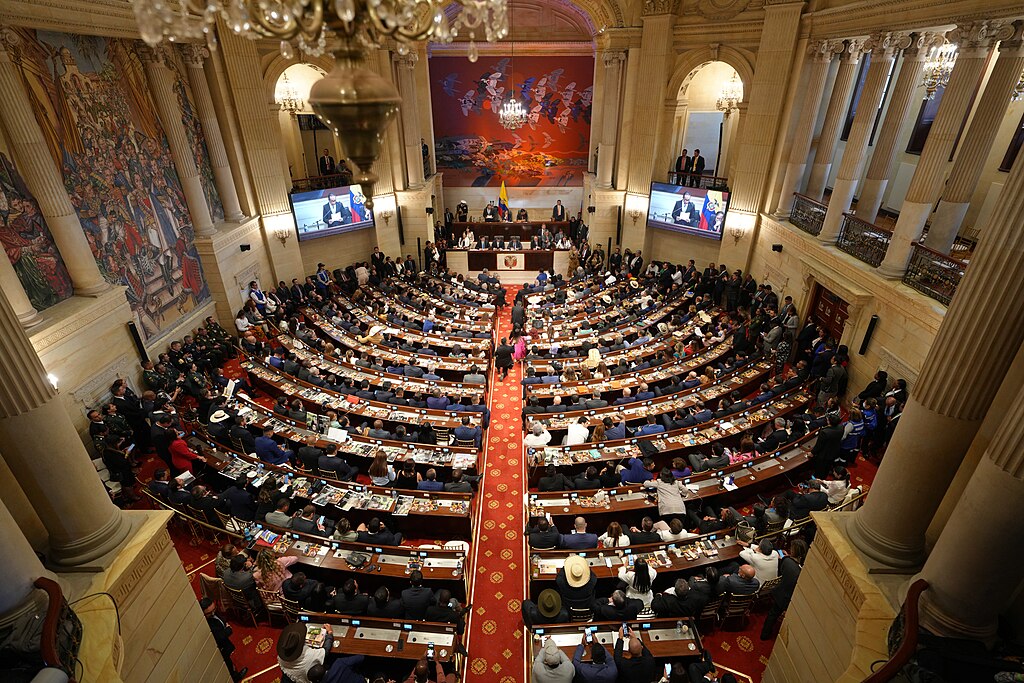
The parliamentary debate on healthcare reform in Colombia continues this Wednesday, following a tumultuous session seen on Tuesday. While progress was made with the approval of ten articles, the defining moment of the meeting was the heated discussion and shouting that marked the conclusion of the debate.
The debate resumed on Tuesday after being suspended due to an altercation between Representative David Racero from the Historical Pact and Representative Andres Forero from the Democratic Center. They became embroiled in a heated exchange of words, ultimately leading to the tumultuous session’s closure.
The renewed debate marks the second attempt, following an earlier inconclusive effort in the first year of the current government. This reform stands as one of the major social overhauls being advanced by the executive, and government representatives anticipate approval in the first half of the forthcoming year.
Pause linked to regional elections
“The Legislative Agenda and the Reform have garnered support from numerous colleagues across different regions. However, the focus is now on the scrutiny of the regional elections. Many of our peers are engrossed in their candidates’ campaigns, striving to ensure the electoral process and the citizens’ decisions at the polls are respected and upheld,” noted the legislative proposal’s rapporteur, Alfredo Mondragón, from the ruling party.
“I believe that the political atmosphere during the regional elections places us in a new phase of consideration. Specifically, all governors and mayors, irrespective of their political affiliations, whether in opposition, independent, or aligned with the government, should converge on a national consensus to ensure success in the regions,” emphasized Mondragón.
It’s noteworthy that over 60 articles of the legislative project have already secured approval, some of which delineate the new responsibilities of the Administrator of the General System of Social Security Resources in Health (ADRES), the state entity that will fund the entire system.
Private insurers pose a major hurdle
The primary challenge facing the parliamentary discourse relates to the role of private insurance companies, which have managed Colombia’s healthcare system for three decades, despite its essentially public financing. The government’s proposed reform champions an expanded role for public management at the expense of private entities.
Nonetheless, the government envisions private companies continuing to exist but with a transformation into health managers responsible for operating a network of service providers to ensure the benefit plan. In other words, this would relegate these insurers to a secondary role in contrast to their present status.
Andrés Forero, a representative from the opposition party Radical Change, noted that the government “must carefully consider what occurred in the regional elections on October 29. We will see if there is indeed a willingness for dialogue, for consensus on the part of the President of the Republic, or if this call for a grand national agreement is an empty discourse that implies the unilateral imposition of the government’s stance.”
Alfredo Mondragón, the rapporteur for the healthcare reform, specifically mentioned that private insurers have not settled their debts to hospitals, despite having already received the money from the state, which is the primary financier of Colombia’s healthcare system. Mondragón claims that private insurance companies “owe 16.6 trillion pesos to clinics and hospitals, and the 11 trillion that should be held in technical reserves also do not appear.”
Another crisis involving a private insurer
Simultaneously, the parliamentary discussions are resuming amidst a new crisis for one of the country’s major private insurers. Sanitas, a prominent private healthcare company, is grappling with the issue of medication supply to its policyholders by Cruz Verde, the pharmaceutical company with which it had an agreement for delivering medications to patients.
Cruz Verde announced on October 30 that it would cease supplying medications to health insurance company Sanitas (EPS) Sanitas, commencing on November 15, citing a 400 billion peso non-payment by the insurer. This development adds another layer of complexity to the project and reopens debates concerning resources for these entities. Sanitas initially accused the government of non-payment, but it later emerged that the claimed sum does not pertain to regular payments, which the State is up to date on, but rather to financial discrepancies that date back to 2020 regarding medication payment.
However, there is some relief for users in the agreement reached by both parties. Sanitas is set to procure the medications, while Cruz Verde will facilitate their delivery to patients. In this regard, the Ministry of Health has pledged to be actively involved in finding a solution to ensure the uninterrupted supply of medications to Sanitas policyholders beyond November 15.

See all the latest news from Colombia and the world at ColombiaOne.com. Contact our newsroom to report an update or send your story, photos and videos. Follow Colombia One on Google News, Facebook, Instagram, and subscribe here to our newsletter.

